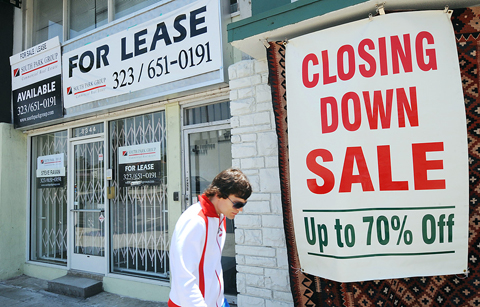The Federal Reserve expects the US economy to improve in coming months, even as policymakers downgraded their outlook for all of this year and said the unemployment rate could approach 10 percent.
Fed Chairman Ben Bernanke and his colleagues continue to believe that business sales and factory production will begin to recover gradually during the second half of this year as US President Barack Obama’s stimulus package and the Fed’s aggressive efforts to lift the country out of recession take hold. They also pointed to signs that the recession’s grip was easing in the current quarter, according to documents released on Wednesday.
At the Fed’s last meeting on April 28 and April 29, policymakers opted not to take any new steps to shore up the economy after launching a US$1.2 trillion effort in March. But some members last month said those plans for buying government debt and mortgage securities may need to be expanded to speed a recovery.

PHOTO: AFP
“Participants noted some improvement in financial conditions in recent months, signs that consumer spending was leveling out and tentative indications that activity in the housing sector might be nearing its bottom,” the documents said.
Even with those positive signals, the economy’s performance for this year as a whole is expected to be dismal, partly reflecting the 6.1 percent annualized drop in economic activity in the first quarter.
Under the Fed’s new projections, the economy will shrink this year between 1.3 and 2 percent. The old forecast said the economy could contract between 0.5 and 1.3 percent.
The unemployment rate may rise as high as 9.6 percent, higher than the old forecast of 8.8 percent. The jobless rate bolted to 8.9 percent in April, the highest in a quarter-century.
The predictions are based on what the Fed calls its “central tendency,” which exclude the three highest and three lowest forecasts made by Fed officials. The Fed also gives a range of all the forecasts that showed some officials expect the jobless rate to hit 10 percent this year.
The Fed expects the economy to grow next year between 2 and 3 percent. It should then pick up more speed in 2011, growing between 3.5 and 4.8 percent, according to the “central tendency” projections. The unemployment rate should drop to between 9 and 9.5 percent next year. It should dip to between 7.7 and 8.5 percent in 2011.

MORE VISITORS: The Tourism Administration said that it is seeing positive prospects in its efforts to expand the tourism market in North America and Europe Taiwan has been ranked as the cheapest place in the world to travel to this year, based on a list recommended by NerdWallet. The San Francisco-based personal finance company said that Taiwan topped the list of 16 nations it chose for budget travelers because US tourists do not need visas and travelers can easily have a good meal for less than US$10. A bus ride in Taipei costs just under US$0.50, while subway rides start at US$0.60, the firm said, adding that public transportation in Taiwan is easy to navigate. The firm also called Taiwan a “food lover’s paradise,” citing inexpensive breakfast stalls

TRADE: A mandatory declaration of origin for manufactured goods bound for the US is to take effect on May 7 to block China from exploiting Taiwan’s trade channels All products manufactured in Taiwan and exported to the US must include a signed declaration of origin starting on May 7, the Bureau of Foreign Trade announced yesterday. US President Donald Trump on April 2 imposed a 32 percent tariff on imports from Taiwan, but one week later announced a 90-day pause on its implementation. However, a universal 10 percent tariff was immediately applied to most imports from around the world. On April 12, the Trump administration further exempted computers, smartphones and semiconductors from the new tariffs. In response, President William Lai’s (賴清德) administration has introduced a series of countermeasures to support affected

CROSS-STRAIT: The vast majority of Taiwanese support maintaining the ‘status quo,’ while concern is rising about Beijing’s influence operations More than eight out of 10 Taiwanese reject Beijing’s “one country, two systems” framework for cross-strait relations, according to a survey released by the Mainland Affairs Council (MAC) on Thursday. The MAC’s latest quarterly survey found that 84.4 percent of respondents opposed Beijing’s “one country, two systems” formula for handling cross-strait relations — a figure consistent with past polling. Over the past three years, opposition to the framework has remained high, ranging from a low of 83.6 percent in April 2023 to a peak of 89.6 percent in April last year. In the most recent poll, 82.5 percent also rejected China’s

PLUGGING HOLES: The amendments would bring the legislation in line with systems found in other countries such as Japan and the US, Legislator Chen Kuan-ting said Democratic Progressive Party (DPP) Legislator Chen Kuan-ting (陳冠廷) has proposed amending national security legislation amid a spate of espionage cases. Potential gaps in security vetting procedures for personnel with access to sensitive information prompted him to propose the amendments, which would introduce changes to Article 14 of the Classified National Security Information Protection Act (國家機密保護法), Chen said yesterday. The proposal, which aims to enhance interagency vetting procedures and reduce the risk of classified information leaks, would establish a comprehensive security clearance system in Taiwan, he said. The amendment would require character and loyalty checks for civil servants and intelligence personnel prior to